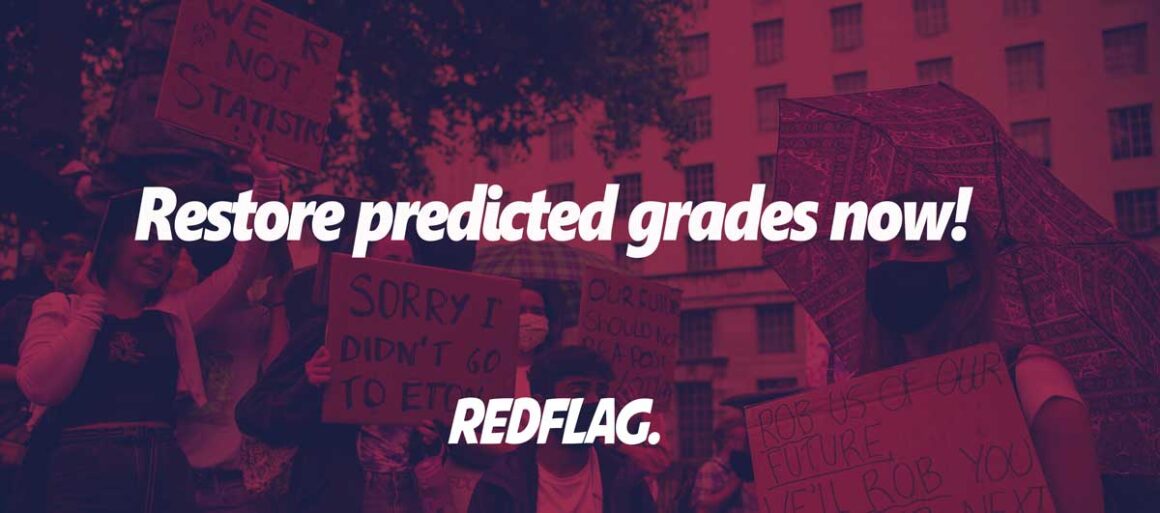

By Dara O’Cogaidhin
Many despondent teachers and students across the country are reflecting on the most shambolic A-level results day in recent times. The cancellation of exams this summer and the replacement processes implemented to award qualifications have proven to be yet another traumatic impact of the COVID-19 pandemic on many young people’s lives and their life chances.
Nearly 40 per cent of A-level grades awarded, affecting around 280,000 students, were lower than teacher predictions. A decade of sustained mistrust and suspicion towards the teaching profession by successive Tory governments saw algorithms replacing teacher’s pedagogical expertise. Students from working-class backgrounds faced the brunt of the downgrades, further entrenching the inequality already running unbridled through our education system. Meanwhile figures from Ofqual showed that the number of grades at A and above rose by 4.7 percentage points in private schools compared to 2019. By contrast, sixth form colleges saw a rise of 0.3 per cent.
For the first time in mainstream examining in the UK, teachers were asked to provide estimated grades and rank orders for students across all subjects. We know from research that teachers’ assessment can be biased, but they can also underestimate some students’ grades in relation to their gender, ethnicity, and social class. This summer students’ individual grades were adjusted in alignment with statistical models that not only included their prior attainment (where available) but also the past performance of the school they attend.
The algorithm did not allow for any consideration of school improvement or students’ own individual efforts to be better than their school counterparts of past years. In other words, students were rewarded and or penalised based on their school and postcode, not their ability. The disparity in outcomes is also the culmination of removing resources from those who need it most. In a political system marred by hereditary peerages, nepotism and opportunity hoarding, this rampant classism in education is nothing new. In 1931 the leading economic historian Richard Tawney wrote that social class was the “hereditary curse” of the British education system.
Protest
One of the most powerful consequences of this year’s examination debacle is the mobilisation of student voices decrying the unfairness of a system that has been forced on them in haste. The lack of consideration of student voice in any qualification reform is not new but the inequalities that have been magnified this summer link directly to a sense of injustice felt by students based on social class, gender, and ethnicity. The U-turn in Scotland is a response to students’ anger who made it clear they will not suffer the indignities of government incompetence.
In England, the utterly gormless Education Secretary Gavin Williamson has ruled out awarding students their teacher predictions. Instead he has offered a ‘triple lock’ promise that allows students to either accept their moderated grade from Ofqual, appeal using their mock exam results or do their examinations this autumn. As a policy solution, it is wholly inadequate and will cause further uncertainty for students. There is no other measure that can rectify this calamity apart from valuing teachers’ professional judgement and awarding their predictions.
The response from the Labour frontbench has been predictably muddled. Sensing that student and parent anger is escalating, the party’s response has shifted from demanding that all A-level appeals fees be waived to allowing teacher assessed marks to be accepted. Students in England should instead look at their peers in Scotland for inspiration. It was the furious backlash of protests across Scotland that ultimately forced the SNP government to U-turn and issue an apology.
The high-stakes testing which has become a hallmark of the Michael Gove-inspired education system has fallen flat on its face. If Gove had not wiped out AS levels, module tests and most coursework would have ensured that the evidence base for predicting results would now be much more robust. There is no doubt we will continue to have a disrupted education system through the next year as it is increasingly clear that this Tory government do not have the virus under control. Therefore, a restoration of a broader approach to assessment is required so that students build a portfolio of results throughout the course. This model of education brings out the best in our students rather than reducing them to a single grade.
The market-driven policies of the past decade have run the education system into the ground. Funding cuts to the state sector have left threadbare special education needs (SEN) resources and threatened overall progress. Socialists in Labour need to ensure the party commits itself to a National Education Service to tackle the gross levels of inequality in Britain’s feudal education system. This includes abolishing private schools. Instead these bastions of privilege should be integrated into the state sector and their wealth redistributed to state education institutions.